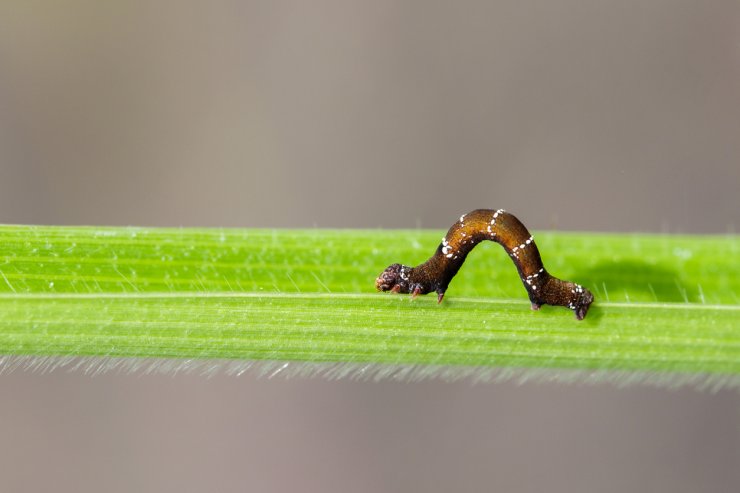
Pest on ginger leaf.
Pests in your ginger garden, left unchecked, can damage and destroy your ginger crop. It’s a good idea to check on the plants each day to make sure no pests are bugging your plants.
Spot the symptoms of ginger plant pests
Check leaves, stems, and rhizomes for these symptoms that come from pests on the prowl!
Root knot nematodes can cause serious damage to your ginger rhizomes. Add beneficial nematodes to counteract the bad ones.
Chinese rose beetles will eat all of your plant’s leaves. The large, brown beetle is nocturnal, so you won’t see them until dusk. Go to the garden after dark with your handy headlamp on, and pick the beetles off. Then spray the ginger leaves with neem oil to make them less appealing to the hungry beetles.
Armyworms, cutworms, and yellow wooly bear caterpillars like to chow down on ginger leaves about as much as Chinese rose beetles do. Use a bacillus thuringiensis spray to eliminate these pests.
Mealybugs and soft scales like to chow on ginger stems and the undersides of the leaves. Dip a cotton swab in alcohol and wipe down your plants as you wipe away these little pests.
Ginger can also attract sucking pests, like aphids, red spider mites, thrips, and fungus gnats. They frequently live in the soil. Neem is a good way to spray them away.
How to treat pests on ginger plants
Here are details on some proven ways to get rid of pests on your ginger plants. Choose the best treatment for the type of pests invading your plants.
- Pick them off, one by one. Use your garden gloves to remove the pests by hand. After removal, destroy pests by drowning them in a bucket of soapy water or crushing them with your foot. Handpicking isn’t efficient or practical for very small pests, but works well with larger pests such as the Chinese rose beetle.
- Apply insecticidal soap. Insecticidal soap is organic. The potassium salts in insecticidal soap help remove an insect’s protective waxes, causing destruction of insect membranes and killing them. Insecticidal soaps are particularly effective on smaller pests such as aphids, psyllids, and spider mites. Mix the soap with water to create your solution, and apply directly to insects on any plants. While insecticidal soap is less apt to affect other organisms, certain plants might be sensitive to the soap and can suffer leaf burn.
- Apply horticultural oils. Combine plant- or petroleum-based oils with water to produce horticultural sprays. Neem oil, for instance, is derived from seed extracts of the neem plant. Oil-based sprays block an insect’s air holes, interfere with an insect’s metabolism, disrupt insect feeding, and inhibit insect growth. Like insecticidal soaps, horticultural oils can cause plant injury if not properly diluted.
- Make your own pest spray. You can make your own pest spray with benign materials. Mix one tablespoon of baking soda, 1/2 teaspoon of a mild dish detergent, and 2 1/2 tablespoons of olive oil in a gallon of water to make a solution that will repel all kinds of bugs; it also works well as a fungicide for blight and mildew on some plants. Shake it well in your bottle before spraying and repeat every week for it to be continuously effective.
Do pests attack your ginger plants every year? How do you handle removing them—and even preventing them in the first place? Please tell us how you treat your ginger plants to avoid pests.


 Previous
Previous


What is a good companion plant that would assist in deterring the insects that might come on ginger
Try cilantro, dill or fennel for natural pest control